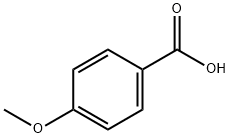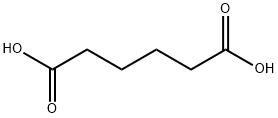4-Methoxybenzoic acid , 98% , 100-09-4
Synonym(s):
p-Anisic acid;p-Methoxybenzoic acid;4-Methoxybenzoic acid;Draconic acid;p-Anisic acid
CAS NO.:100-09-4
Empirical Formula: C8H8O3
Molecular Weight: 152.15
MDL number: MFCD00002542
EINECS: 202-818-5
| Pack Size | Price | Stock | Quantity |
| 25G | RMB23.20 | In Stock |
|
| 100G | RMB36.00 | In Stock |
|
| 250G | RMB85.60 | In Stock |
|
| 500G | RMB122.40 | In Stock |
|
| 2.5KG | RMB490.40 | In Stock |
|
| others | Enquire |
PRODUCT Properties
| Melting point: | 182-185 °C(lit.) |
| Boiling point: | 275 °C |
| Density | 1.385 |
| bulk density | 380kg/m3 |
| vapor pressure | 0.001Pa at 25℃ |
| FEMA | 3945 | 4-METHOXYBENZOIC ACID |
| refractive index | 1.571-1.576 |
| Flash point: | 185 °C |
| storage temp. | Store below +30°C. |
| solubility | H2O: soluble2500 parts |
| form | Powder |
| pka | 4.50(at 25℃) |
| color | White to slightly gray-beige |
| PH | 3-4 (0.3g/l, H2O, 20℃) |
| Odor | at 10.00 % in dipropylene glycol. faint putrid sweet cadaverous |
| Odor Type | animal |
| biological source | synthetic |
| Water Solubility | Soluble in water at 20°C 0.3g/L. Soluble in alcohol, ethyl acetate and ether. |
| Merck | 14,666 |
| JECFA Number | 883 |
| BRN | 508910 |
| Stability: | Stable. Incompatible with strong oxidizing agents. |
| InChIKey | ZEYHEAKUIGZSGI-UHFFFAOYSA-N |
| LogP | 1.96 |
| CAS DataBase Reference | 100-09-4(CAS DataBase Reference) |
| NIST Chemistry Reference | Benzoic acid, 4-methoxy-(100-09-4) |
| EPA Substance Registry System | Benzoic acid, 4-methoxy- (100-09-4) |
Description and Uses
P-Anisic acid, also known as 4-Methoxybenzoic acid or draconic acid, is an organic acid that has a sweet flavor. It is one of the isomers of anisic acid, including m-anisic acid and o-anisic acid. The term "anisic acid" often refers to this form specifically. P-anisic acid is produced through the oxidation of p-cresyl-methyl ether.
4-Methoxybenzoic acid (p-Anisic acid) is used in oxidation and reduction of cytochrome c in solution through different self-assembled monolayers on gold electrodes using cyclic voltammetry. p-Anisic acid has antiseptic properties. It is also used as an intermediate in the preparation of more complex organic compounds.
Safety
| Symbol(GHS) |  GHS07 |
| Signal word | Warning |
| Hazard statements | H302-H315-H319-H335 |
| Precautionary statements | P264-P280-P302+P352+P332+P313+P362+P364-P305+P351+P338+P337+P313-P261-P305+P351+P338-P301+P312+P330 |
| Hazard Codes | Xi,Xn |
| Risk Statements | 36/37/38-22 |
| Safety Statements | 26-36-24/25 |
| WGK Germany | 1 |
| RTECS | BZ4395000 |
| Autoignition Temperature | 185 °C |
| Hazard Note | Irritant |
| TSCA | Yes |
| HS Code | 29189090 |
| Toxicity | LD50 orally in Rabbit: > 5000 mg/kg |



